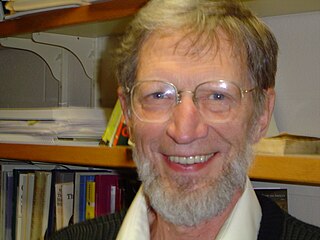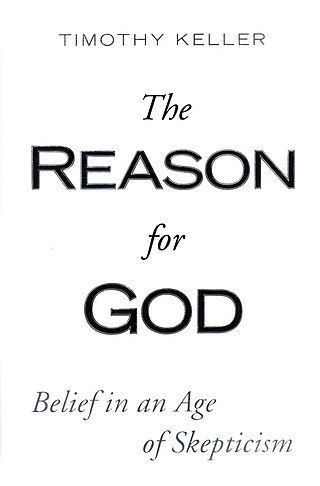Faith is confidence or trust in a person, thing, or concept. In the context of religion, faith is "belief in God or in the doctrines or teachings of religion". According to Merriam-Webster's Dictionary, faith has multiple definitions, including "something that is believed especially with strong conviction," "complete trust", "belief and trust in and loyalty to God", as well as "a firm belief in something for which there is no proof".
Natural theology, once also termed physico-theology, is a type of theology that seeks to provide arguments for theological topics based on reason and the discoveries of science, the project of arguing for the existence of God on the basis of observed natural facts, and through natural phenomena viewed as divine, or complexities of nature seen as evidence of a divine plan or Will of God, which includes nature itself.
Philosophy of religion is "the philosophical examination of the central themes and concepts involved in religious traditions". Philosophical discussions on such topics date from ancient times, and appear in the earliest known texts concerning philosophy. The field is related to many other branches of philosophy, including metaphysics, epistemology, logic and ethics.
Skepticism, also spelled scepticism in British English, is a questioning attitude or doubt toward knowledge claims that are seen as mere belief or dogma. For example, if a person is skeptical about claims made by their government about an ongoing war then the person doubts that these claims are accurate. In such cases, skeptics normally recommend not disbelief but suspension of belief, i.e. maintaining a neutral attitude that neither affirms nor denies the claim. This attitude is often motivated by the impression that the available evidence is insufficient to support the claim. Formally, skepticism is a topic of interest in philosophy, particularly epistemology.
The problem of evil is the question of how to reconcile the existence of evil and suffering with an omnipotent, omnibenevolent, and omniscient God. There are currently differing definitions of these concepts. The best known presentation of the problem is attributed to the Greek philosopher Epicurus. It was popularized by David Hume.
An argument from nonbelief is a philosophical argument that asserts an inconsistency between the existence of God and a world in which people fail to recognize him. It is similar to the classic argument from evil in affirming an inconsistency between the world that exists and the world that would exist if God had certain desires combined with the power to see them through.

Alvin Carl Plantinga is an American analytic philosopher who works primarily in the fields of philosophy of religion, epistemology, and logic.
Philosophical skepticism is a family of philosophical views that question the possibility of knowledge. It differs from other forms of skepticism in that it even rejects very plausible knowledge claims that belong to basic common sense. Philosophical skeptics are often classified into two general categories: Those who deny all possibility of knowledge, and those who advocate for the suspension of judgment due to the inadequacy of evidence. This distinction is modeled after the differences between the Academic skeptics and the Pyrrhonian skeptics in ancient Greek philosophy. In the latter sense, skepticism is understood as a way of life that helps the practitioner achieve inner peace. Some types of philosophical skepticism reject all forms of knowledge while others limit this rejection to certain fields, for example, to knowledge about moral doctrines or about the external world. Some theorists criticize philosophical skepticism based on the claim that it is a self-refuting idea since its proponents seem to claim to know that there is no knowledge. Other objections focus on its implausibility and distance from regular life.

Richard Granville Swinburne is an English philosopher. He is an Emeritus Professor of Philosophy at the University of Oxford. Over the last 50 years, Swinburne has been a proponent of philosophical arguments for the existence of God. His philosophical contributions are primarily in the philosophy of religion and philosophy of science. He aroused much discussion with his early work in the philosophy of religion, a trilogy of books consisting of The Coherence of Theism, The Existence of God, and Faith and Reason.
The existence of God is a subject of debate in theology, philosophy of religion and popular culture. A wide variety of arguments for and against the existence of God or deities can be categorized as logical, empirical, metaphysical, subjective or scientific. In philosophical terms, the question of the existence of God or deities involves the disciplines of epistemology and ontology and the theory of value.

In the philosophy of religion, Reformed epistemology is a school of philosophical thought concerning the nature of knowledge (epistemology) as it applies to religious beliefs. The central proposition of Reformed epistemology is that beliefs can be justified by more than evidence alone, contrary to the positions of evidentialism, which argues that while non-evidential belief may be beneficial, it violates some epistemic duty. Central to Reformed epistemology is the proposition that belief in God may be "properly basic" and not need to be inferred from other truths to be rationally warranted. William Lane Craig describes Reformed epistemology as "One of the most significant developments in contemporary religious epistemology ... which directly assaults the evidentialist construal of rationality."
Religious skepticism is a type of skepticism relating to religion. Religious skeptics question religious authority and are not necessarily anti-religious but rather are skeptical of either specific or all religious beliefs and/or practices. Socrates was one of the most prominent and first religious skeptics of whom there are records; he questioned the legitimacy of the beliefs of his time in the existence of the Greek gods. Religious skepticism is not the same as atheism or agnosticism, and some religious skeptics are deists.
Jewish skeptics are Jews who have held skeptical views on matters of the Jewish religion. In general, these skeptical views regard some or all of the "principles of faith," whatever these may be, but historically Jewish skepticism is directed either at (1) the existence of the God of Judaism or (2) the authenticity and veracity of the Torah.
Agnostic atheism or atheistic agnosticism is a philosophical position that encompasses both atheism and agnosticism. Agnostic atheists are atheistic because they do not hold a belief in the existence of any deity and are agnostic because they claim that the existence of a divine entity or entities is either unknowable in principle or currently unknown in fact.

The Reason for God: Belief in an Age of Skepticism (2008) is a book and DVD on Christian apologetics by Timothy J. Keller, a scholar and founding pastor of Redeemer Presbyterian Church in New York City.
Skeptical theism is the view that people should remain skeptical of their ability to discern whether their perceptions about evil can be considered good evidence against the existence of the orthodox Christian God. The central thesis of skeptical theism is that it would not be surprising for an infinitely intelligent and knowledgeable being's reasons for permitting evils to be beyond human comprehension. That is, what may seem like pointless evils may be necessary for a greater good or to prevent equal or even greater evils. This central thesis may be argued from a theistic perspective, but is also argued to defend positions of agnosticism.
Religious epistemology broadly covers religious approaches to epistemological questions, or attempts to understand the epistemological issues that come from religious belief. The questions asked by epistemologists apply to religious beliefs and propositions whether they seem rational, justified, warranted, reasonable, based on evidence and so on. Religious views also influence epistemological theories, such as in the case of Reformed epistemology.
Jordan Howard Sobel was a Canadian-American philosopher specializing in ethics, logic, and decision theory. He was a professor of philosophy at the University of Toronto, Canada. In addition to his areas of specialization, Sobel made notable contributions in the fields of philosophy of religion, and value theory. Before his death, Sobel was considered by Christian apologist William Lane Craig to be the leading philosophical defender of Atheism prior to Graham Oppy.
Yujin Nagasawa is a Japanese-born British philosopher specialising in the philosophy of religion, the philosophy of mind and applied philosophy.

Deus revelatus refers to the Christian theological concept coined by Martin Luther which affirms that the ultimate self-revelation of God relies on his hiddenness. It is the particular focus of Luther’s work the Heidelberg Theses of 1518, presented during the Heidelberg disputation of 1518. In Christian theology, God is presented as revealed or Deus revelatus through the suffering of Jesus Christ on the cross. Debate of the term is found in the field of philosophy of religion, where it is contested among philosophers such as J. L. Schellenberg. The term is usually distinguished from Luther's concept of Deus absconditus, which affirms the fundamental unknowability of the essence of God. However, Luther proposed that God is a revelation who uses the fog to obscure himself. This distinction which permeates his theology has been the subject of wide interpretation, leading to controversy between theologians who believe the terms to be either antithetical or identical. These two conflicting strands of thought present the main problem when interpreting Luther’s doctrine of the Revealed God. In recent years the term has been used to inform modern analysis of religious themes such as evolution.





